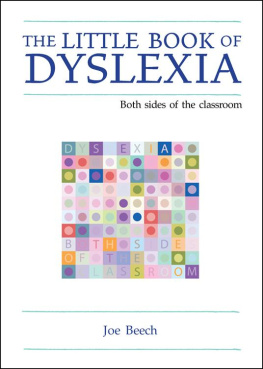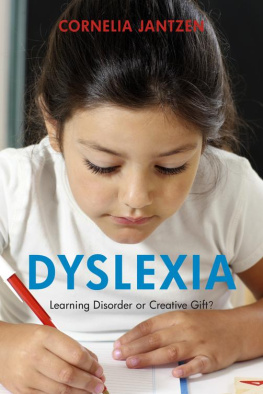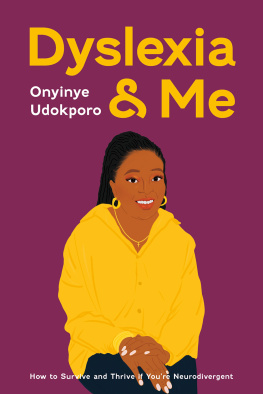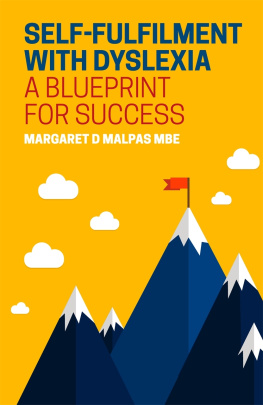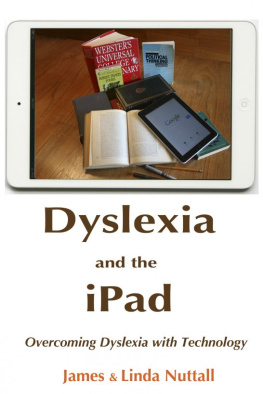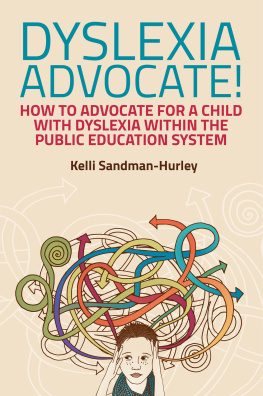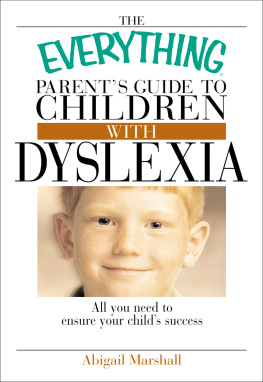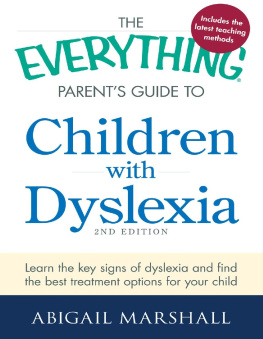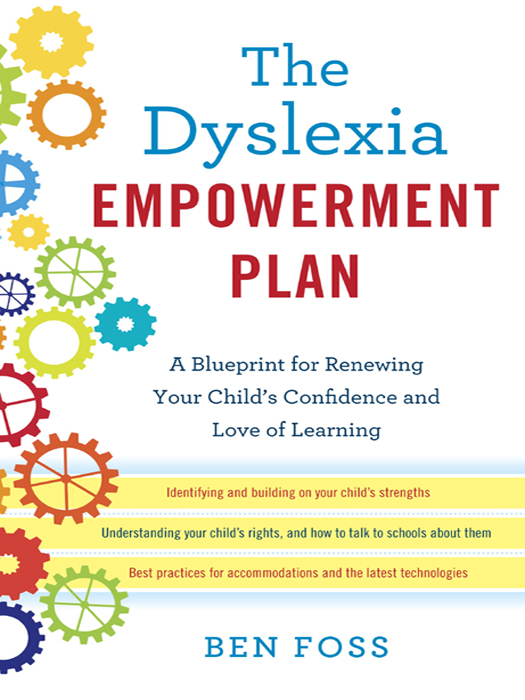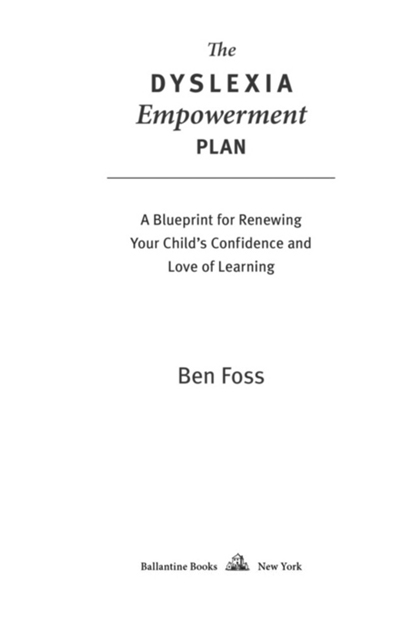The Dyslexia Empowerment Plan is a guide to helping children understand their dyslexia, gain confidence in themselves, and figure out what they need to thrive in the world. Although it includes a number of specific suggestions, The Dyslexia Empowerment Plan is not a one-size-fits-all program and must be read with your childs individual situation in mind. In particular, neither this nor any other book can replace the advice you may receive from an attorney who is knowledgeable about applicable law and familiar with your school-age childs background.
As of press time, the URLs displayed in this book link or refer to existing websites on the Internet. Random House, Inc., is not responsible for, and should not be deemed to endorse or recommend, any website other than its own or any content available on the Internet (including without limitation at any website, blog page, information page) that is not created by Random House. The author, similarly, is not responsible for third party material.
Copyright 2013 by Ben Foss
All rights reserved.
Published in the United States by Ballantine Books, an imprint of The Random House Publishing Group, a division of Random House LLC, a Penguin Random Company.
B ALLANTINE and the H OUSE colophon are registered trademarks of Random House LLC
The National Center for Learning Disabilities Checklist is excerpted from The Dyslexia Toolkit. Copyright 2013 by National Center for Learning Disabilities, Inc. All rights reserved. Reprinted with permission.
For more information, visit www.LD.org.
H EADSTRONG N ATION is a registered trademark of Ben Foss.
Intel Reader is a registered trademark of Intel Corporation.
LIBRARY OF CONGRESS CATALOGING-IN-PUBLICATION DATA
Foss, Ben.
The dyslexia empowerment plan : a blueprint for renewing your childs
confidence and love of learning / Ben Foss. First edition.
pages cm
Includes bibliographical references.
eISBN: 978-0-345-54124-6
1. Dyslexia. 2. Dyslexic childrenRehabilitation. 3. Parents of
children with disabilities. I. Title.
RJ496.A5F67 2013
618.928553dc23 2013023931
www.ballantinebooks.com
Jacket design: Misa Erder
Web asset: Excerpted from The Dyslexia Empowerment Plan by Ben Foss, copyright 2013 by Ben Foss. Published by Ballantine Books, an imprint of The Random House Publishing Group, a division of Random House, Inc., New York.
v3.1
CONTENTS
INTRODUCTION
S ome people think being successful when you are dyslexic means overcoming dyslexia. Nothing could be further from the truth. By many measures, I have achieved success: I have worked in the White House; Ive got a combined JD/MBA from Stanford University; I directed a research group at Intel; I started Headstrong Nation, a not-for-profit organization dedicated to serving the dyslexic community; and now, in the ultimate irony for a dyslexic person, Ive written a book.
I know that Ive been able to accomplish my goals because I have integrated dyslexia into my life, not because I overcame it. It is part of who I am, just as I am a man and I am from New Hampshire. Indeed, I have found that my greatest strengths are directly tied to my most severe weaknesses. It is the process of recognizing my weaknesses and strengthsand connecting them in my lifethat has made me successful and, more important, happy.
What Ive learned can provide a path to independence for anyone who is dyslexic. It took me almost twenty-five years to fully embrace my dyslexia, and throughout the book youll follow my journey. My goal is to give you the tools to empower your child so that you can let go of your own fears, opening the door to a successful future for both of you. If I had had these tools when I was growing up, I would have started the integration process much earlier and skipped years of debilitating shame.
This book is not like anything else you have read about dyslexia or specific learning disabilities, the legal category under which services for us dyslexics are provided. Whereas most other books or experts will promise a cure for your child, Im here to say that the real truth is that there is no disease. In the mainstream dyslexics are the minority, but that doesnt make us less valuable. We just do things a little differently. To use a commercial metaphor, its like were Macs, whereas the majority of people are PCs. This bookand your mission as a parentis about moving the model for your child from dyslexia as disease to dyslexia as identity, an identity we can all be proud of.
WELCOME TO DYSLEXIA
Whether your child is on the cusp of being identified or youve known about his dyslexia for quite some time, I say welcome to the club! Its safe here, and you can let go of your fear and anxiety about this identification. Believe me, I know how you feel. I was there and so were my parents, and I can tell you with 100 percent certainty that it will get better. Indeed, youre going to have fun. That may seem overly optimistic, but I am confident that if you work through the steps in this book, your child will reclaim her joy of learning and you will both thrive.
There are countless accomplished people who are already in this club today. They are successful academics, win Nobel Prizes, make major contributions to the arts, and are at the top of the medical, legal, and business worlds. They are cops and firefighters and pilots. They are teachers and authors, entrepreneurs and filmmakers. In short, they are able to do whatever they want once they master a few simple rules of success. Whether you are dyslexic yourself, the parent of a dyslexic child, or both, know that you are not alone. This book will show you the path to figuring all of these rules out for yourself, your child, and your family.
Regardless of cultural or economic differences, I feel a great sense of community with everyone who is dyslexic. Its like we grew up in the same place, the same countrythe Nation of Dyslexia. We have a shared experience, a connectedness, and its palpable when we are together. Many of us have the same strengths (exceptional auditory or verbal skills, or the ability to think strategically) and the same weaknesses (such as reading poorly). Dyslexia is part of more than 30 million Americansone in ten of us. Every time your child gets on the school bus and there are fifty people on that bus, there are likely five other kids who are dyslexic.
In the Nation of Dyslexia, nobody spells well. Theres no good handwriting. But were great listeners and often good public speakers. I like to think we are fun at parties. We work harder than many of our mainstream peers. Yet my emigration into mainstream culture does not mean I have to divorce myself from my dyslexic attributes. If youre from another country and immigrate to the United States, you will likely want to adopt some American customs. But you wont completely leave your homeland culturethe food, the dance, the work ethic, the holidaysbehind.






